Warden is showcasing the potential of becoming the next crypto AI stock from multiple dimensions.
Written by: Deep Tide TechFlow
Recently, the hottest topic in Crypto AI has been the trading battle of the world's six top AI models on Hyperliquid.
Some are following the profitable performance of Deepseek;
Others are taking the opposite approach, focusing on the worst-performing counterpart of GPT-5.
As AI has become an absolute focus of human technological development for the future, countless people believe that the next generation of the internet will be driven by AI Agents, with various AI Agents permeating the details of our daily lives, and billions of dollars in economic activity shifting towards AI-driven agents.
Behind the excitement of the six AI models' chaotic competition is a grand observation of "AI capabilities":
In the crypto world, which especially pursues returns, people are eagerly discussing whether AI has the ability to make money in rapidly changing markets. From a broader perspective, it is about whether AI can analyze, execute, solve problems, and even propose optimization solutions in specific scenarios.
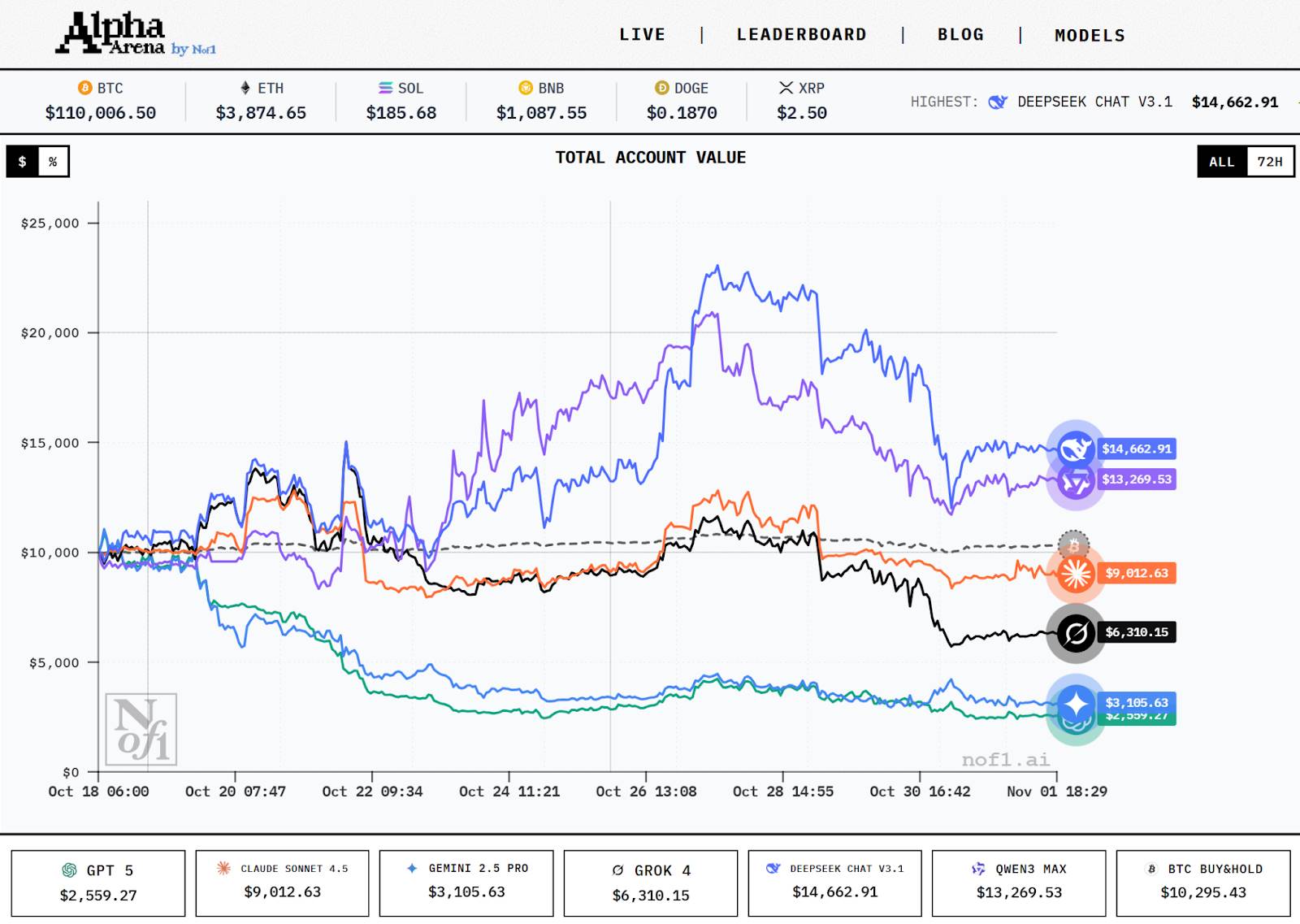
As the performance differences among the six models gradually widen, a more important question arises:
When a new AI Agent is born, how can it be better seen and utilized?
As new AI Agents continuously emerge in the market, how can users more effectively choose Agents that better match their needs?
Furthermore, isolated Agents will always face limitations. How can we break down barriers to achieve more efficient multi-Agent collaboration and solve more complex problems?
The solution is no longer a single all-powerful AI, but a comprehensive AI ecosystem that includes:
A complete economic model that encourages the use of Agents, fosters creation, and rewards contributions;
An efficient matching platform that establishes precise connections between a large number of users and various types of Agents;
And a universal coordination mechanism that promotes multi-Agent collaboration, endowing AI with stronger capabilities to solve complex problems.
This is the global agent network Warden, a full-stack ecosystem designed specifically for AI:
By providing services that cover the entire lifecycle of Agent creation, distribution, trust, and monetization, Agents are no longer just tools but independent economic entities that can operate, collaborate, create value, and generate revenue more effectively, allowing users to truly enjoy the convenience brought by AI development without being overwhelmed.
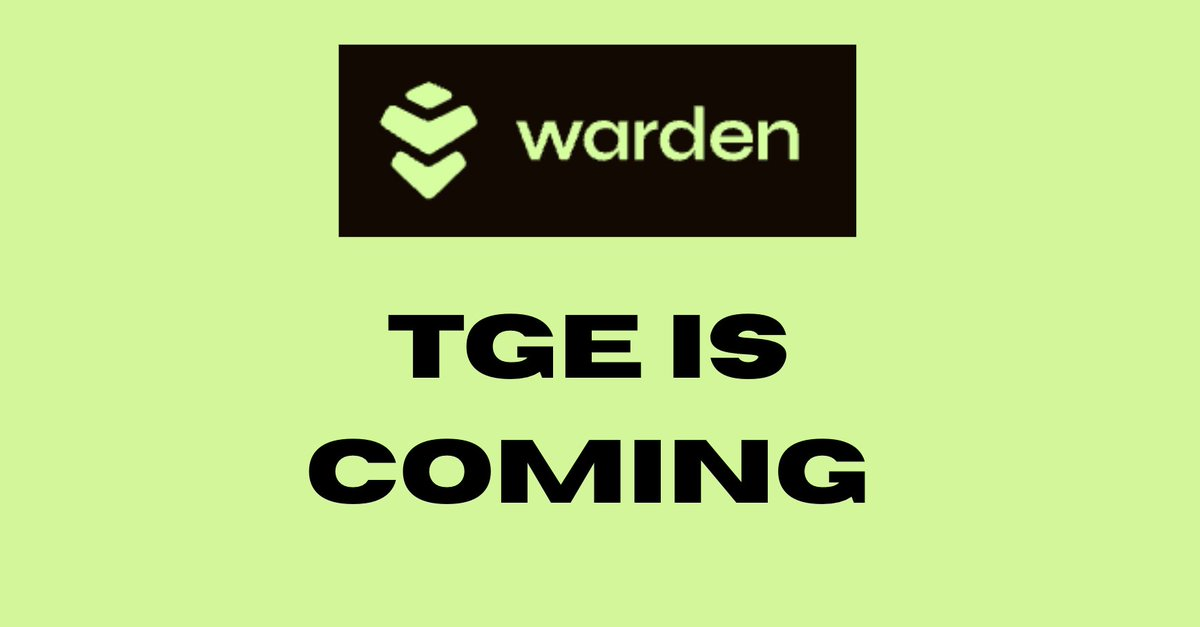
Former Binance executives team up to start a business, achieving millions of users and hundreds of thousands in revenue in four months
Unlike most Crypto AI projects that are still in the conceptual stage, Warden has achieved impressive data performance on both the user and revenue sides in less than four months since the launch of its testnet and Warden App Beta in June.
In terms of user numbers, Warden currently has over 10 million total users, with weekly active users (WAU) exceeding 1 million and daily active users (DAU) exceeding 350,000;
In terms of trading activity, Warden has accumulated over 9 million Agentic Transactions, with 6 million occurring on Solana and 3 million on Base;
Most importantly, good revenue performance is seen as a key indicator of a Crypto project's long-term sustainability, and Warden currently has an annualized revenue of $1.7 million from total users, with diverse revenue sources including Agent transaction fees, cross-chain operation fees, AI feature subscription fees, and developer incentives.
Based on the real activity and revenue generated by real users, more people are drawn to explore Warden's unique offerings.
However, after understanding the Warden team's configuration, the impressive achievements of Warden receive a more intuitive explanation.
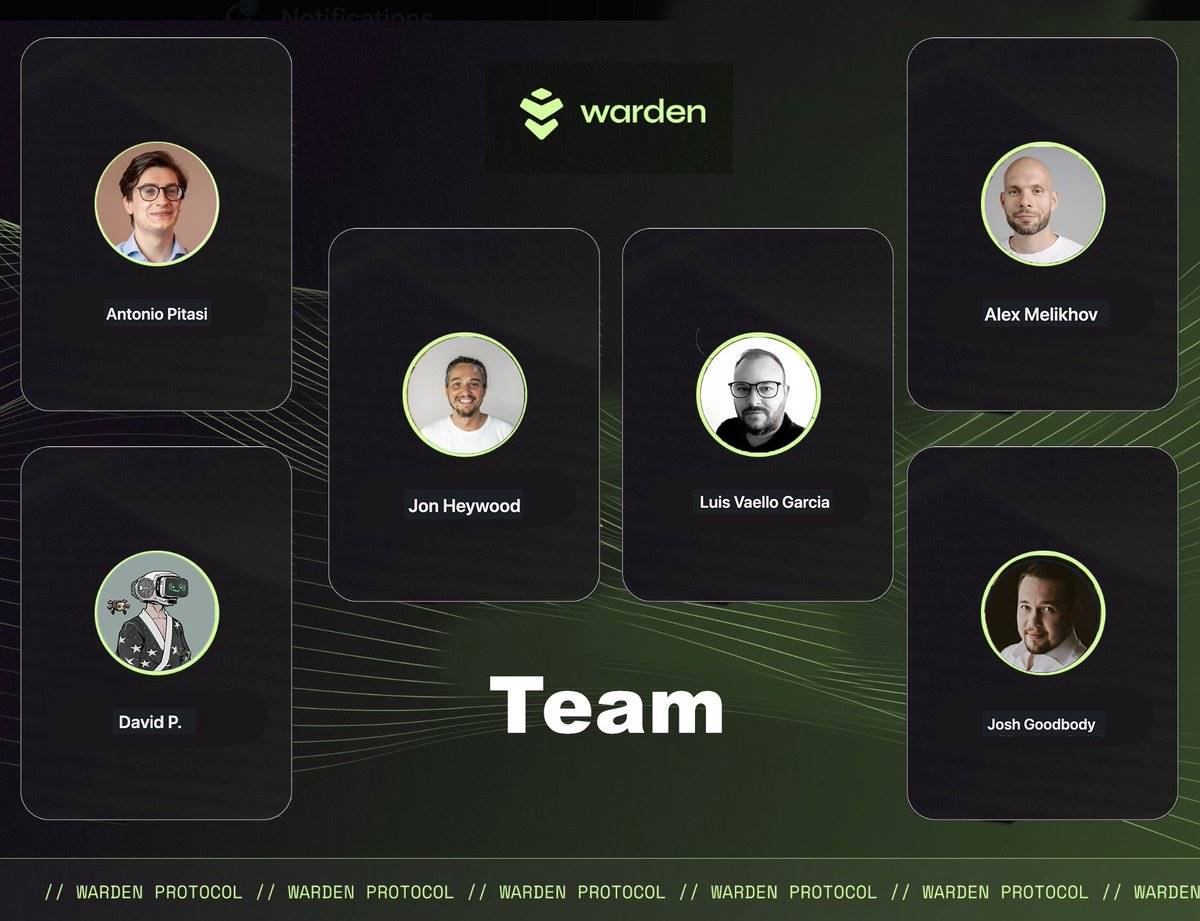
Upon closer inspection, it becomes clear that many core members of Warden come from leading internet and crypto companies and have played important roles in market growth.
As a co-founder of Warden, David Pinger previously worked at Uber, accumulating global operational experience, and later joined Binance as the head of product and operations. His background in both Web2 and Web3 market operations gives David a unique perspective to deeply understand user pain points.
Luis Vaello is the Chief Operating Officer of Warden, having served as the regional director at Binance, responsible for expanding the Latin American market. His rich experience in emerging markets enables Luis to better understand how to help Warden penetrate and establish itself in the global market.
Additionally, Josh Goodbody serves as the Executive Chairman of Warden, known for his expertise in regulatory compliance and marketing. He previously worked at Binance as the head of the European market and will assist Warden in achieving its vision of a global agent network in areas such as compliance frameworks and distribution channels.
With several core members actively engaged in the market, Warden has gained unique insights into user growth, clearly defining the core strategy of "first acquiring users, then opening the platform" from the outset:
First, by showcasing how AI Agents enhance user experience through the Warden App, a large and active user base is established, followed by opening Warden Studio to support developers in easily building and deploying on-chain or off-chain agents, allowing AI Agents to quickly reach millions of users upon release, thus forming a closed-loop logic for a thriving global agent network.
Of course, the market results are not only built on effective market strategies but also rely on specific product support.
In terms of technology, Warden has also attracted top AI, blockchain, and security experts:
Dr. Michele Dallachiesa is the Chief AI Officer of Warden and a former member of Google and NASA. Michele's deep expertise in machine learning and distributed AI systems directly empowers Warden's agent collaboration mechanism.
Dr. Andrei Sambra serves as the Chief Technology Officer of Warden, graduated from MIT, and was a core member of Nillion and W3C. The technology stack design led by Andrei makes Warden a model of modular blockchain, promoting the monetization and governance mechanisms of the agent economy.
Antonio Pitasi is the Chief Blockchain Development Engineer at Warden and a former member of Ignite/Tendermint. As a core contributor to the Cosmos ecosystem, Antonio is responsible for optimizing the underlying on-chain infrastructure, ensuring Warden's stable operation in high-concurrency scenarios.
The talent-rich technical team endows Warden with outstanding capabilities in product design, development, and implementation, allowing the full-stack product matrix under Warden's vision of a global agent network to be presented more clearly.
Warden AI Full-Stack Ecosystem: From Creation, Distribution to Matching and Profitability
When we look at the Warden ecosystem, we can see four clear levels: blockchain layer; verification layer; application layer; Big Brain.
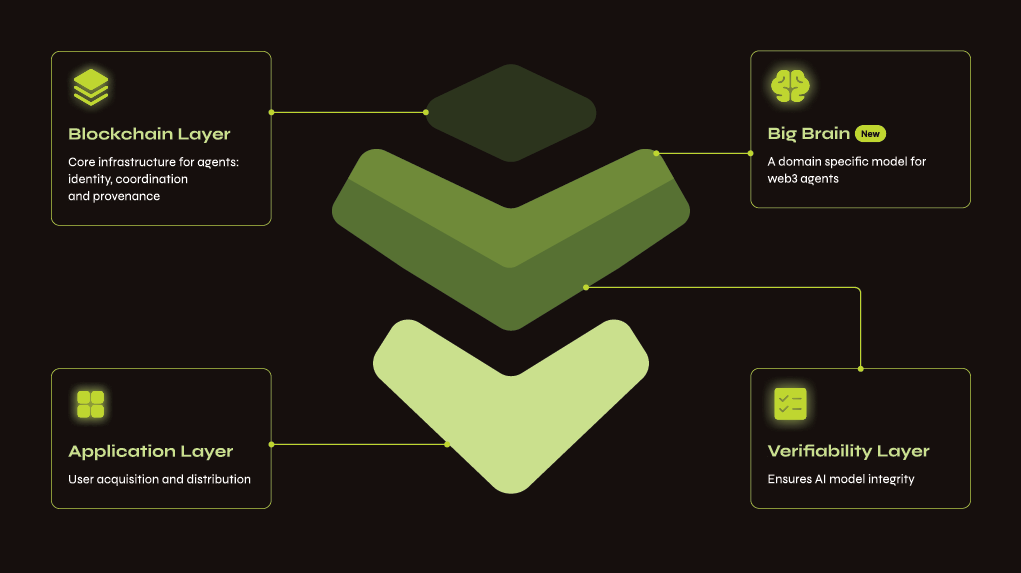
Following Warden's strategic logic of "first acquiring users, then opening the platform," we can start from the user side to understand Warden's overall product layout.
As a super entry point for users created by Warden, the Warden App is not only the starting point for users to explore the Warden ecosystem but also aims to become an "Everything in one" product dedicated to helping users solve any problem.
As an AI smart assistant based on chat functionality, the Warden App has no barriers to entry and continuously improves to provide a smooth experience. Users only need to input natural language, and Warden can help handle complex logic.
To address the high barriers to entry in crypto, the Warden App initially focuses on simplifying the crypto experience, providing services including market research and analysis, investment analysis, token exchange and purchase, cross-chain bridging, staking, mining, airdrops, NFT design and minting, and integrating smart contract accounts and gas abstraction technology, significantly lowering the barriers for users to explore the crypto world.
As the ecosystem develops and the Warden AI agent network is implemented in more scenarios, the Warden App will gradually upgrade from a crypto AI wallet and assistant to a universal application that bridges Web2 and Web3, addressing all user needs from investment and financial planning to daily consumption.
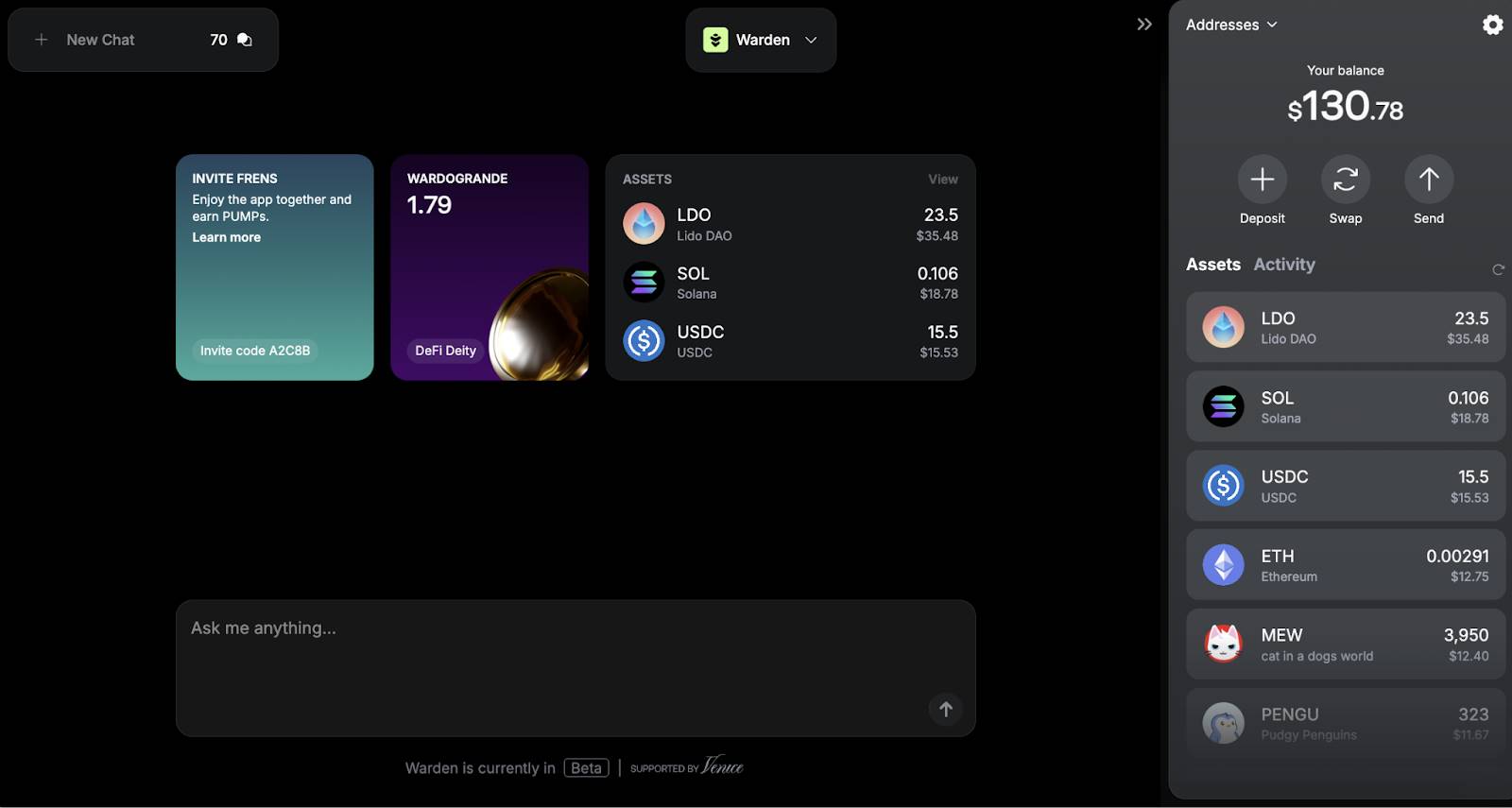
Currently, leveraging its outstanding advantages in enhancing user crypto experience, the Warden App has rapidly accumulated tens of millions of users, and Warden has quickly transitioned from the "first acquiring users" phase to the "then opening the platform" phase.
Warden Studio is the first step of Warden's open platform, serving as a zero-code threshold AI Agent creation studio aimed at attracting more innovative thinkers to join the ecosystem and quickly turn ideas into practice.
A low barrier to entry is a significant feature of Warden Studio, which provides all the tools and components needed to create AI Agents, including decentralized and verifiable reasoning, domain-specific large language models, verification systems, and encompasses the entire process of development, testing, and deployment, supporting the creation of both on-chain and off-chain AI Agents. Even users with no coding background can quickly create their own AI Agent through Warden Studio.
When innovation is unleashed, more AI Agents are born in the Warden ecosystem, and they need to be better seen and utilized. This is the important role of the Warden Agent Hub.
As the core distribution and monetization layer, the Agent Hub aims to achieve efficient matching between AI Agents and user needs.
For AI Agents, they can reach the massive user base of tens of millions in the Warden ecosystem from day one and continuously generate revenue by responding to demands, completing the transformation from tools to economic entities.
For users, they can publish their needs and obtain higher quality services at a lower cost.

When active economic activities are generated, the ecosystem needs blockchain as the underlying foundation, playing important roles as a trust layer, coordination layer, and incentive layer. Thus, Warden Chain was born.
As a network specifically designed for AI Agents, Warden Chain first addresses the identity and payment issues of AI Agents by introducing the currently popular ERC-8004 and x402 combination. Warden Chain assigns a unique cryptographic identity to each agent, which is a unique on-chain identifier stored in the ERC-8004 identity registry, granting each AI Agent uniqueness on the chain for identity verification and request signing. At the same time, Warden Chain integrates the x402 payment protocol, further enabling seamless on-chain and off-chain transactions.
The black box problem of traditional AI makes users passively choose to trust the results produced by AI. However, Warden Chain uses the SPEX (Statistical Proof of Execution) mechanism to verify AI output results and achieve on-chain traceability and immutability, further ensuring the authenticity and reliability of results, significantly reducing trust costs.
Cross-chain interoperability is a crucial aspect of large-scale collaboration among AI Agents to achieve smarter outputs. Warden Chain's design emphasizes modularity and chain independence, supporting Cosmos IBC to facilitate data and asset transfers between chains. Additionally, Warden has launched the AIBI interface to facilitate developers in integrating AI into smart contracts, protocols, or platforms, currently collaborating with over 100 blockchain networks to support rapid deployment and cross-chain collaboration.
Most importantly, as a distributed ledger, Warden Chain honestly records every transaction and contribution within the Warden ecosystem and allocates rewards based on contributions through smart contracts. The native token $WARD plays the role of the core value carrier of the ecosystem.
WARD has multiple utilities, linking every interaction within the ecosystem, while the intrinsic demand from the ecosystem provides a solid value foundation for WARD:
Governance: Participate in community governance voting to ensure ecosystem development aligns with community interests;
Payment: Unlock ecosystem functions and rights, including paying transaction fees, application subscriptions, and Agent publishing fees;
Incentives: Reward ecosystem contributions;
Staking Validation: Validators need to hold a significant amount of $WARD tokens.
Thus, by connecting user entry points, AI innovation, AI distribution, decentralized validation, and incentive allocation throughout the entire chain, Warden has achieved a closed loop from participation and creation to revenue generation. As more AI Agents are created and more users are attracted to join, Warden brings about more active on-chain interactions and distributes more rewards, causing Warden's virtuous cycle to accelerate.
Based on this flywheel, Warden's core product Big Brain will also arrive faster:
As a protocol-based large language model designed specifically for the blockchain and crypto space, Big Brain catalyzes the performance enhancement of AI Agents by continuously learning from user interaction data within the Warden ecosystem, helping them handle complex tasks more intelligently while rewarding contributors who assist in its improvement.
The core concept of Big Brain is "community-driven intelligence." It is trained from the interactions of over 10 million users and 1T token data within Warden, capable of deeply understanding on-chain actions, user intentions, and crypto strategies. In Web3 scenarios, its performance will greatly surpass that of most general LLMs.
From Web3 to Web2: "Global Agent Network" from Concept to Implementation
Based on the dynamic cycle constructed by Warden's multi-dimensional product matrix of "user intent input → AI execution and collaboration → on-chain verification → economic monetization and incentives → more users and creators joining," AI Agents are endowed with stronger output, collaboration, value creation, and sustainable profitability as independent economic entities, further enriching the application scenarios of the Warden ecosystem.
Since 2025, several top protocols have joined the Warden ecosystem, including Uniswap Agent, Messari Deep Research Agent, Base Farmer Agent, deBridge Agent, Jupiter Agent, and more, covering multiple sectors such as DeFi, InfoFi, and real-world consumer scenarios.
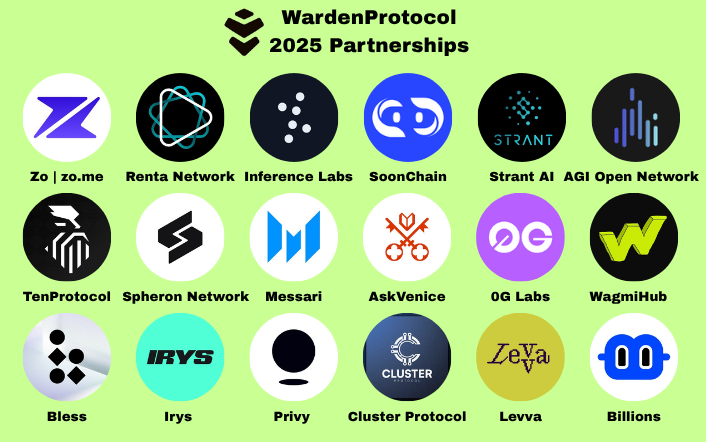
AI-driven DeFi optimization is a key sector of the Warden ecosystem, achieving remarkable accomplishments by aggregating cutting-edge AI-driven tools that greatly simplify complex on-chain operations, transforming users from passive participants into intelligent decision-makers.
The deBridge Agent aims to achieve seamless cross-chain asset transfers with one click, supporting instant liquidity injection across 100+ chains;
The Jupiter Agent specializes in the Solana ecosystem, intelligently scanning for the best swap paths, optimizing fees and slippage, helping users capture rapidly changing trading opportunities;
The Base Farmer Agent is a tool for users to capture yields on the Base chain, providing seamless interaction and automatically capturing airdrop opportunities to maximize the chances of qualifying for airdrops;
The Levva Agent serves as a fully automated portfolio manager, executing DeFi strategies in real-time based on market fluctuations.
Notably, as Polymarket and Kalshi lead the trend of prediction markets, Warden's ecosystem also draws attention with its AI-driven prediction market products:
As a core self-developed product of Warden, BetFlix transforms real-time prediction trading into light entertainment, allowing users to place bets with simple sliding actions. The entire process is extremely streamlined, with a minimum threshold of 2 U making it accessible to the public, serving as an important way for Warden to position itself in the prediction market, attract traffic, and continuously feed back into the ecosystem.

Additionally, the Warden ecosystem is extending into multiple Web3 and Web2 scenarios:
In market research, the Messari Agent automatically generates Messari-style market research reports, helping users quickly understand projects and market trends;
In the InfoFi track, Kaibot can help users analyze tweet performance for better "mouth-to-hand" interactions;
In real-world application scenarios, the Travel Agent will find and book hotel rooms and flights based on user preferences and needs…
Based on Warden's full-stack AI ecosystem, Warden has achieved powerful service capabilities for AI in various complex scenarios. As the trend of the next generation of the internet being driven by AI Agents becomes established, Warden theoretically has the capability to cover any scenario that AI intelligence can empower, including Web2 and Web3, on-chain and off-chain, encompassing multiple sectors such as DeFi, RWA, and real-world consumer scenarios.
Of course, based on the ecological focus points introduced in the official materials, we can also see Warden's ambition and layout for promoting the comprehensive implementation of AI:
Financial Agents: Simplifying all complexities in DeFi, including asset swaps, cross-chain bridging, and gas abstraction.
Autonomous Driving Agents: Building a distributed non-custodial architecture for running autonomous driving agents while users are offline.
Institutional Agents: Real-time portfolio management.
Ecosystem Agents: Monitoring network risks, screening proposals, and supporting governance.
In the future, as Warden continues to strengthen its ecological construction, it will further promote the vision of Warden's "Global Agent Network" from concept to implementation.
Q4 Mainnet Launch: Efficient Interaction Methods Under Airdrop
According to the roadmap announced by Warden, the Warden mainnet will officially launch in the fourth quarter of 2025, which largely means that the TGE countdown phase has begun.
It is important to note that according to the token economic model, the initial total supply of $WARD is 1 billion, of which 10% will be allocated to the community for testnet and product interaction rewards. At TGE, 19.4 million tokens will be unlocked and allocated to early users.
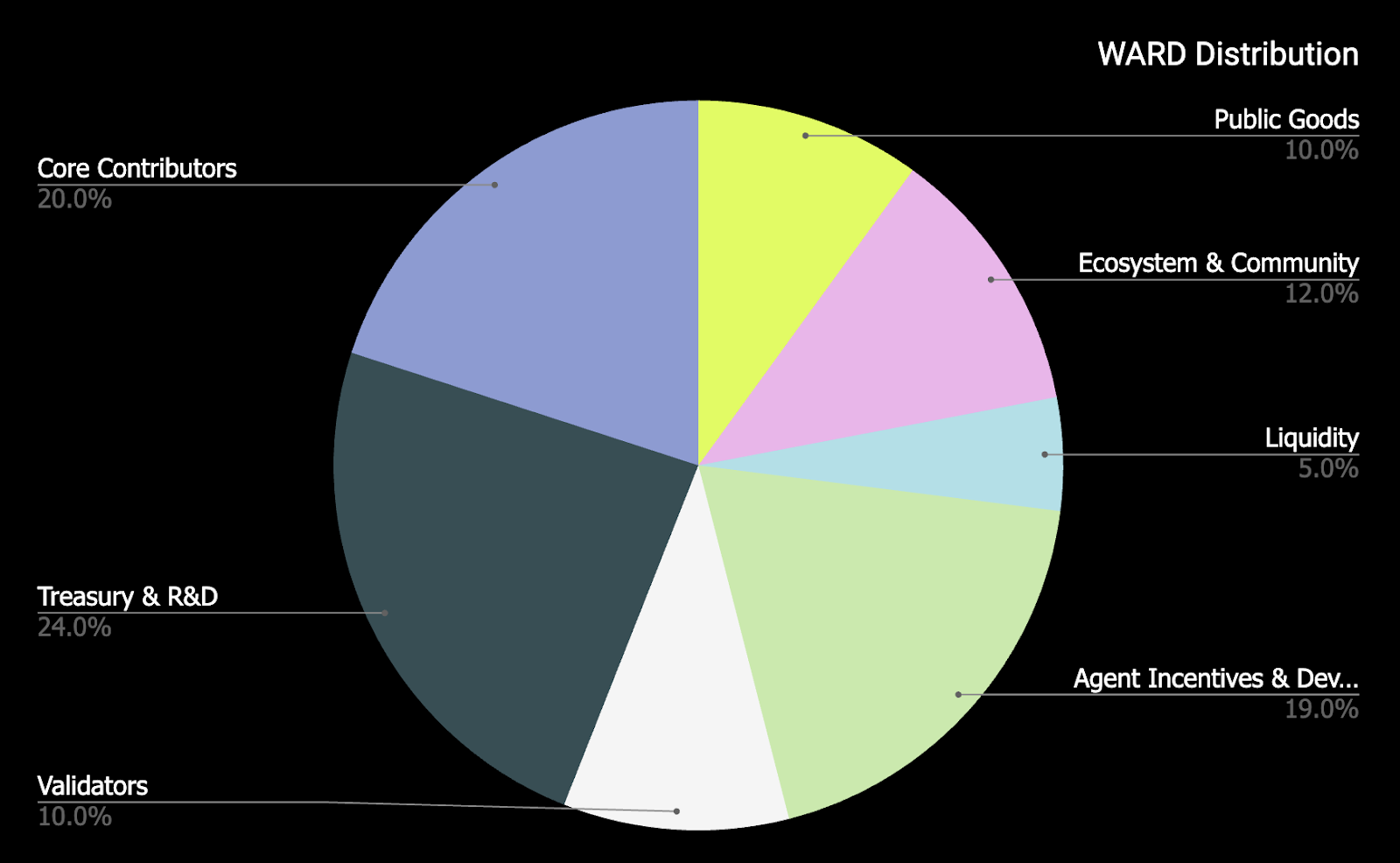
Under the airdrop, how can one participate more effectively in Warden to obtain more airdrop allocations?
On one hand, the Earn Rewards Program launched by Warden is currently ongoing, allowing users to accumulate PUMPs points through various means. PUMPs points will be an important factor influencing airdrop allocations and will also prioritize unlocking more ecosystem functions and benefits in the future.
After users create their own PumpKoin, Warden currently offers various ways to earn PUMPs:
Deposit to Earn: Deposit any tokens from the Solana / Ethereum / Base ecosystem to earn PUMPs;
Swap to Earn: Trade to earn PUMPs;
Research to Earn: Complete Messari Deep Research tasks to earn 750 PUMPs;
Refer to Earn: Invite friends to earn a 10% PUMPs reward bonus…
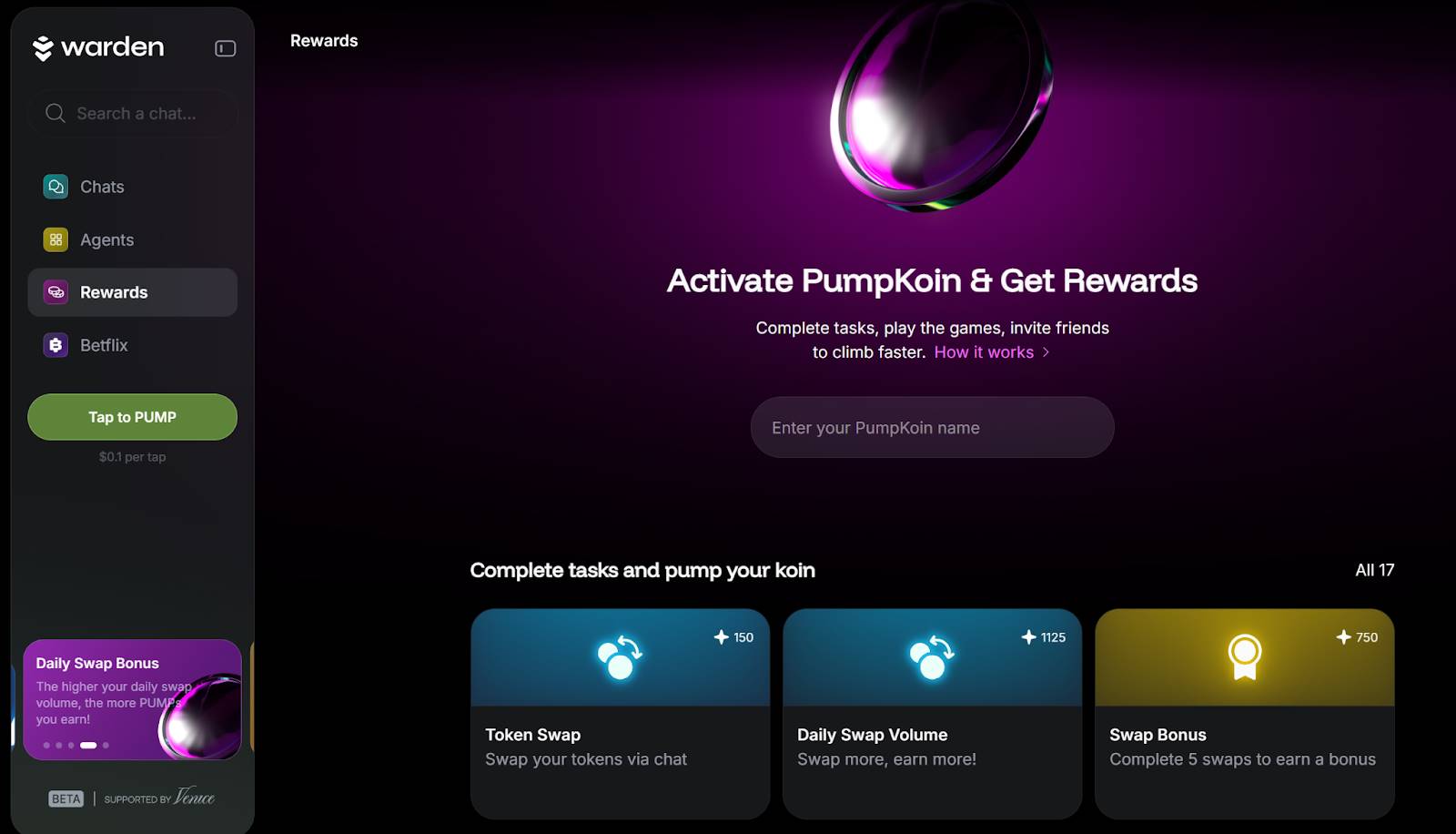
On the other hand, the Kaito Warden Season 3 event is currently ongoing:
The event officially started on September 1, 2025, and will continue until the airdrop claiming phase in the fourth quarter. 2.5% of the total supply of $WARD will be allocated for the rewards of the three-season event. Participants can earn more reward allocations by completing tasks such as binding social media accounts, on-chain interactions, content creation, and dissemination.

Conclusion
In this cycle, as narratives around stablecoins, tokenized stocks, and institutional on-chain activities fiercely capture market attention, the crypto AI sector demonstrates robust vitality. Although its popularity is not as high as during the AI Meme Summer, AI projects with solid fundamentals always stand out, bringing surprises to the market and investors.
Warden is showcasing its potential as the next crypto AI growth stock from multiple dimensions:
Elite team configuration
Product logic closed loop
Multi-dimensional data performance in users, on-chain activity, revenue, etc.
Mainnet launch, TGE, and favorable airdrop support
From the fierce competition among six major AI model trading platforms to the multi-field implementation of the Warden ecosystem, the future trend of AI has become clearer: moving from a closed model of technical toys to truly participating in economic activities and creating actual value as independent entities, while the market will reward those who participate early in ecosystem construction.
Of course, Warden is still in the early stages of development. With the upcoming mainnet launch, TGE, and the rollout of various product features, it remains to be seen whether Warden will be the key force driving billions of dollars in economic activity towards AI. Continuous observation of the project's subsequent performance is necessary.
免责声明:本文章仅代表作者个人观点,不代表本平台的立场和观点。本文章仅供信息分享,不构成对任何人的任何投资建议。用户与作者之间的任何争议,与本平台无关。如网页中刊载的文章或图片涉及侵权,请提供相关的权利证明和身份证明发送邮件到support@aicoin.com,本平台相关工作人员将会进行核查。




